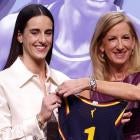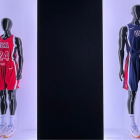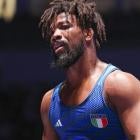 |
| From left, Sally Pearson, out-leans Nevin Yanit, Kellie Wells, Dawn Harper and Phylicia George to win gold. (US Presswire) |
The biggest American name in Tuesday's 100-meter hurdle final, Lolo Jones, failed to medal. But two other Americans -- Dawn Harper and Kellie Wells -- did make it to the podium.
Both found the finish line split seconds behind Australia's Sally Pearson, though, because Pearson set an Olympic record with her 12.35-second run. Harper crossed in 12.37 and Wells made it through in 12.48. You can see just how close it was in this photo.
Jones took fourth (12.58).
 |
| Related links |
While waiting for her time/the result of the race, Pearson stood on the track and stared at the scoreboard. When it lit up with her time atop of all others, she let out a gleeful, horror movie-like scream. Pearson was set up for this kind of finish, for the record. She ran a 12.39 in her 100-meter hurdles semifinal, which was just shy of the previous Olympic record. She looked as strong as she ever has in this event.
Harper and Wells also ran impressive semifinal times. In a way, this was like the men's 100-meter final from Sunday, when Usain Bolt set an Olympic record, while Yohan Blake and Justin Gatlin set records for second and third -- but for as impressive as those runs/times were, they couldn't compete for gold. Pearson was brilliant here, but that shouldn't take anything away from Harper and Wells, who were considered more than medal hopefuls; they were favorites. And they ran as expected. This race was one of the closest, most exciting track competitions we've seen so far in these Games.
As for Jones, a hearty footnote on her race and still-molding legacy. She took third in her semifinal heat, running it in 12.71, just barely qualifying for this final. That signifies real growth at this point in her career. Entering the U.S. trials in June, Jones had the ninth-fastest American time of the year. The real perspective is this: Lolo Jones wasn't running well for most of the year. Some believed she gutted/nipped her way into the Olympics. She herself admitted in previous weeks just how badly she was performing, so much so she was self-deprecating about it -- while going on the Tonight Show. Harper and Wells did not receive any talk-show invitations.
The fact she ran and placed as high as she did Tuesday is mighty impressive. But for the second straight Olympics, Jones doesn't reach the podium in her defining event. She's now one of the most famous American Olympians to never get that precious reward draped over her neck.
The problem here is not Jones' performance. It's the disconnect between athlete image and pragmatic expectation. The New York Times got a lot of flack for this piece on Jones from Sunday, but it gets at something sports fans have ripped LeBron James over for years now. Image before -- or over -- performance. It's the plaudits earned without evidence of indisputable achievement that bothers sports fans.
Only sports fans don't know Jones that well. They know her on occasional basis, whenever the Olympic calendar thrusts her into the press and on TV sets for trials and finals. And she is a woman, so there is an innate softer approach to her underwhelming results -- however unfair that is.
For Jones, she became well-known not for winning, but for stumbling in Beijing, for being a virgin, for being an athlete with personality, for being an abnormal Olympian because she seemed so damn normal. There's nothing wrong with that, but when millions of Americans watch this final on television Tuesday night, they're going to see Jones lose and wonder how that could have happened because they'll feel like they were told -- even promised -- Jones was one of the country's best Olympians.
The reality is Jones was never close to that. She wasn't even America's best hurdler for these Games, nor the second-best, as Tuesday definitively proved. She came, she competed, she competed quite well in the ultimate race. We can leave it at that. Jones will be fine and her image won't suffer because of it, because it thrived prior to the Olympics even without a medal to back up the pub.
She remains a podium virgin, but despite that disappointment, it's hard to figure how Jones could look back at her return to the Olympics at not see how the path she chose was worth it. Winning always makes the story better, but in her case it didn't seem necessary to the narrative.




















